The government is discussing the question of changing the way garbage collection is calculated. It is proposed that the cost of services will depend on the number of containers installed at the garbage disposal site. This was announced by the executive director of the Russian environmental operator Alexei Makrushin, reports TASS.
“The government is working on a mechanism for how to settle payments“ in fact ”... The system will in many respects resemble calculation by standards. The number of containers will be considered on the basis of standard values. Then you can multiply five containers for 30 days, get 150 containers and count on the basis of this fee. It turns out to be a rather complicated formula for how to scatter this amount between offices and apartments, ”said Makrushin.
Recall that the existing pricing system is based on statistical data. To calculate the cost of garbage collection service, the accumulation rate for the residents of this particular region is taken (in tons or cubic meters) and multiplied by the tariff of the regional operator for moving 1 ton or cubic meter of waste, respectively. The resulting number is divided by the number of days.
- © Press Service of the City of Khimki
On the need to transfer to the payment of garbage disposal "in fact" in a conversation with RT, said the chairman of the Green Patrol Board, an expert of the ONF Environmental Monitoring and Forest Protection Center, a member of the Public Council at the Federal Service for Natural Resources Supervision of the Russian Federation, Andrei Nagibin. According to him, the problem of changing the tariff calculation scheme was long overdue.
“We had two payment collection systems: per square meter and per person. Everywhere in the subjects these themes were implemented differently. Now it’s very important to change the savings rates to savings “in fact”, and we talked about this a long time ago, because now people have to pay unrealizable payments to rural residents and holiday villages, ”the expert said.
According to him, the accumulation rates in many subjects are "inaccurate, sometimes even overestimated." The transition to payment "in fact" will be most beneficial to residents of rural areas, said Nagibin. At the same time, he believes that the new system should be introduced in stages.
"More fair calculation"
The head of the Moscow Union of Housing Organizations, Konstantin Krokhin, believes that the new settlement system is more accurate and profitable.
“I believe that in those regions where the reform of MSW (solid municipal waste) has already been carried out, the transition to the calculation for actual containers is fairer than the calculation for the number of people living. Because it takes into account the actual amount of waste that will be exported, ”the expert is sure.
He also recalled that earlier the method of calculating the number of containers used in gardening associations. Summer residents collectively entered into a contract, and payment was charged on the number of containers.
The need to change the principle of calculating the tariff for garbage collection in April 2019, said Russian Prime Minister Dmitry Medvedev. According to him, the existing system of payment for garbage is “not completely fair.” The premier said that the fee must be charged in accordance with the actual accumulation of waste, and not at the established tariff. He also called for encouraging people to separate garbage collection.
Innovations in this area appeared in the framework of the so-called “junk reform”, which started in Russia in early 2019. For the period until 2030, the government has planned to make a number of changes in the process of collecting and disposing of expenses.
At first, separate garbage collection will gradually be introduced in different regions of the Russian Federation. In addition, waste will pass through waste sorting plants, part of the solid waste will be sent for recycling and reuse. In March, the Ministry of Natural Resources and Environment reported that already 80% of the territories switched to a new form of waste management.
In addition, the responsibility for the entire process of moving debris from tanks to landfills in each region will be assigned to a single operator. Failure to comply with the regulations and the disposal of waste that is suitable for recycling will be penalized.
The government is also working to eliminate hazardous landfills, in 2018, 28 such landfills were abolished. In the near future, it is planned to close the “Black Hole” and “Igumnovo” landfills in Dzerzhinsk, Nizhny Novgorod Region, “Krasny Bor” in the Leningrad Region, and the Kuchino test site in Balashikha.

